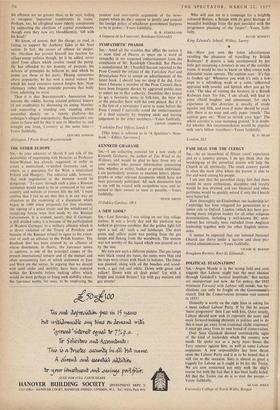THE OTHER EUROPE SIR,—In your editorial of March 8 you
talk of the desirability of negotiating with Moscow, as Professor Seton-Watson has already suggested, in order to create a neutralised, re-unified Germany and, in return, as a guarantee for the West, a neutralised Poland and Hungary. The editorial adds, however, that such negotiation at the moment would be ' dangerouS: `To carry through such a plan a Russian statesman would need to be in command in his own country and nobody, at present fills the bill.' I must confess that I fail to see that this is in any way an objection to the reopenitig of a discussion which began in 1949 when proposals for free elections, the signing of a peace treaty and the withdrawal of occupying forces were first made by the Russian Government. It is evident, surely, that if Germany is still divided today it is because of the participation of Western Germany in a military alliance which is in direct violation of the Treaty of Potsdam and because of the Russian refusal to agree to the exten- sion of such an alliance to the Polish frontier. The deadlock that has been created by an alliance of whose dissolution, in theory, the Spectator seems to approve, is one of the principal causes of the present international tension and of the mutual and often unreasoning fear of which statesmen in East and West are the victim. In arguing that we should wait until order and stability have been restored within the Kremlin before making offers which would do most perhaps to bring such stability about, the Spectator seems, for once, to be employing the
prudent and over-subtle arguments of the news- papers which do ther utmost to justify and conceal the foreign policy of whichever government happens to be in power.—Yours faithfully,


































 Previous page
Previous page